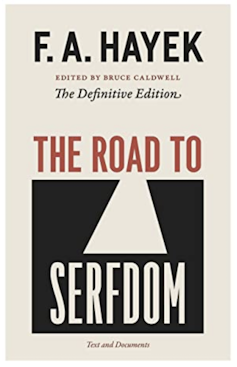what critics get wrong about the Austrian economist
- Written by Conor O'Kane, Senior Lecturer in Economics, Bournemouth University

“The most powerful critique of socialist planning and the socialist state”, is how Margaret Thatcher described Friedrich von Hayek’s book, The Road to Serfdom. Published in March 1944 during the Austrian economist’s tenure at the London School of Economics (LSE), the book has been enduringly popular among free-market liberals.
Among its admirers was Winston Churchill, who as prime minister released 1.6 tons of precious war-rationed British government paper to allow additional copies to be printed. More recently Elon Musk tweeted[1] a photo of The Road to Serfdom with the caption “Great Book by Hayek” to his 174 million followers, no doubt bringing Hayek’s work to a new generation.
On the other hand, the Austrian is often seen[2] by the left as an intellectual bogeyman, an enabler of unfettered greed, minimal social responsibility and soaring inequality.
So who was Hayek and why does The Road to Serfdom matter?
How laissez-faire fell out of favour
Born into an upper middle-class Vienna family in 1899, Hayek earned doctorates in law (1921) and political science (1923) at the city’s university. He first made a name for himself in economics in 1928, publishing a report for his research institute employer that predicted the Wall Street crash of 1929 (some critics argue[3] that his achievement gets exaggerated).
Hayek spent 18 years at the LSE (1932-1950), before moving to the University of Chicago (1950-1962). There he worked alongside Milton Friedman, another seminal advocate for free-market principles.
These views were profoundly unfashionable at the time. The social democrat consensus had been shaped by “robber barron” period of the late 19th and early 20th centuries. Key industries such as rail and oil had been dominated by cartels and monopolies, leading to massive wealth inequalities.
Then came the Wall Street crash and great depression, prompting a loss of confidence in economists and economic reasoning. Free-market capitalism took much of the blame. Socialism was offered as a realistic and even desirable alternative.
Prominent colleagues of Hayek’s at the LSE, including political scientist Harold Laski and sociologist Karl Mannheim, believed socialist planning was inevitable in the UK. The Labour party explicitly warned in a 1942 pamphlet[4] against a “return to the unplanned competitive world of the inter-war years, in which a privileged few were maintained at the expense of the common good”.







